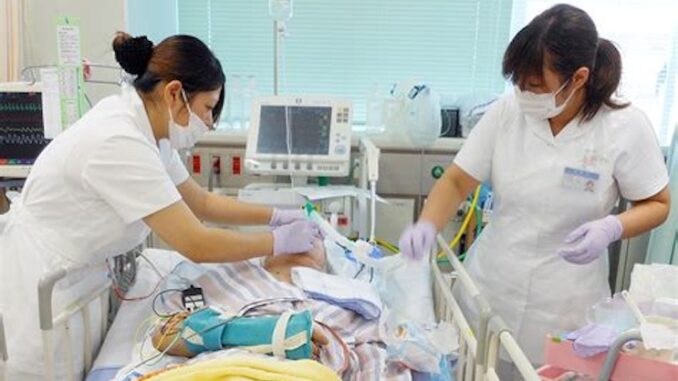by Sean Adl-Tabatabai, The Peoples Voice:

A groundbreaking Japanese study has revealed that mRNA COVID vaccines are “supercharging cancer,” linking repeated vaccinations to worse survival rates in pancreatic cancer patients. Published as a pre-print on April 15, the study raises urgent concerns about the safety of these jabs.
On April 16, the World Health Organization (WHO) finalized a draft for an international pandemic agreement, promoting the global sharing of mRNA vaccines. This draft, set for adoption by WHO member country representatives at the upcoming World Health Assembly, ignores mounting evidence of the vaccines’ risks.
TRUTH LIVES on at https://sgtreport.tv/
Despite growing data on serious adverse effects and increased mortality linked to mRNA vaccinations, the WHO’s push to expand their use is alarming yet unsurprising. The globalist organization’s agenda is to continue to promote the deadly mRNA jabs over addressing the documented dangers.
Expose-news.com reports: Japanese scientists have completed a study of the effect of covid-19 vaccination on Pancreatic Cancer (“PC”) patients in their hospital system entitled ‘Repeated Covid-19 Vaccination as a Poor Prognostic Factor in Pancreatic Cancer: A Retrospective, Single-Centre Cohort Study’. The study is having a global impact; within a day of its publication, it has already been downloaded 4,000 times.
The study begins with the obligatory homage to mRNA technology damning it with faint praise as “a significant technological advance,” which is a misrepresentation still necessary to ensure the paper’s acceptance for publication (yes, journals are still clinging on to the fantasy).
It then plunges into the detailed story of cancer vulnerability. It examined the impact of covid-19 vaccinations on the survival of 272 PC patients in their hospital admitted between January 2018 and November 2023.
Pancreatic cancer is an aggressive cancer with a low survival rate (about 10-12% after 5 years). It is often detected at a late stage when it is already invading nearby structures, eventually metastasising to other parts of the body. The Japanese study found that repeated covid-19 booster vaccinations are associated with poorer overall survival in patients with PC.
Patient outcomes had improved each year by 2020; however, it began to deteriorate in 2021 and outcomes in 2022-2023 were significantly worse than those in 2018-2021.Abue, M.; Mochizuki, M.; Shibuya-Takahashi, R.; Ota, K.; Wakui, Y.; Iwai, W.; Kusaka, J.; Saito, M.; Suzuki, S.; Sato, I.; Tamai, K. Repeated COVID-19 Vaccination as a Poor Prognostic Factor in Pancreatic Cancer: A Retrospective, Single-Centre Cohort Study. Preprints2025, 2025041167. https://doi.org/10.20944/preprints202504.1167.v1
The authors investigated a possible mechanism and concluded as follows (emphasis added):
Notably, our analysis reveals that high levels of IgG4 [an immune suppressant we have discussed in many previous reports including our ‘Open Letter to Medical Professionals and Life Scientists’] induced by vaccination, correlate with a detrimental prognosis in these patients. These insights provide essential information regarding the interplay between vaccination and cancer progression, which has significant implications for patient management strategies. Our study highlights the necessity for ongoing research into the long-term effects of mRNA vaccinations on cancer prognosis, which remains a pressing concern in the evolving landscape of public health and cancer treatment.Abue, M.; Mochizuki, M.; Shibuya-Takahashi, R.; Ota, K.; Wakui, Y.; Iwai, W.; Kusaka, J.; Saito, M.; Suzuki, S.; Sato, I.; Tamai, K. Repeated COVID-19 Vaccination as a Poor Prognostic Factor in Pancreatic Cancer: A Retrospective, Single-Centre Cohort Study. Preprints2025, 2025041167. https://doi.org/10.20944/preprints202504.1167.v1
The complex statistical analysis involved detailed consideration and matching into groups for age, sex, comorbidities, treatment history, vaccination history, etc. Overall, those covid-19 vaccinated twice had a longer survival than those vaccinated three times (p=0.006). Microbiological testing found a reduced immune response in the three-times-vaccinated group compared to the twice-vaccinated group. The study did not examine outcomes for other cancer types. I leave this omission for your reflection.
The enduring mystery is why our health system is still recommending and encouraging mRNA covid-19 vaccination. The release of this study follows on from the release of dozens of others we have reported (see HERE for example), documenting serious adverse effects and higher death rates following mRNA vaccination. Yet on the same day as the study release, 16 April, the World Health Organisation announced a legally binding agreement among its members (including New Zealand) on how to respond to future pandemics. Central to this agreement, which is set to be ratified in May, is the “sharing” of drugs and vaccines between rich and poor nations. A better word than sharing might be “proliferation.”
Read More @ ThePeoplesVoice.tv



